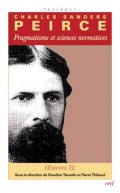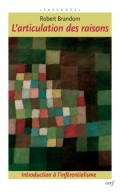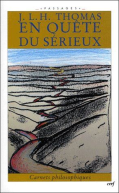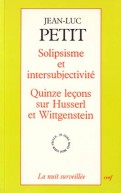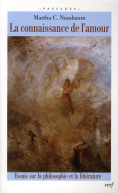
Pragmatisme et pragmaticisme
Collection Passages
496 pages - oct. 2002
63,00€
Charles Sanders Peirce (1839-1914), philosophe, logicien, mathématicien et scientifique américain, est surtout connu comme le fondateur du pragmatisme (mouvement souvent associé au matérialisme, à l'empirisme et aux noms de William James et de John Dewey). Cette philosophie à part entière instaure une nouvelle médiation entre théorie et pratique, fondée sur une réévaluation du langage symbolique, de la sémiotique (ou théorie des signes), des catégories de la pensée, et de la métaphysique. En dépit de son extraordinaire productivité, l'œuvre de Peirce se présente souvent de manière fragmentée. Avec « Pragmatisme et pragmaticisme » commence la publication française des principaux écrits de ce philosophe majeur, dont l'œuvre est indispensable pour comprendre l'évolution de philosophes européens ou « continentaux » comme Habermas et Apel aussi bien que celle des courants qui se rattachent à la philosophie analytique. Les « Œuvres » veulent combler une lacune et présenter au public français un choix significatif des multiples facettes de la pensée de Peirce par ordre thématique et le plus souvent chronologique. Les résultats de la recherche en cours menée par l'édition américaine (Peirce Edition Project, Université d'Indiana) sont pris en compte, et l'édition s'appuie sur les manuscrits autographes (en donnant toujours les références). Le volume I, « Pragmatisme et pragmaticisme » comporte deux parties : dans la première, un ensemble de textes retrace, par ordre chronologique, l'élaboration progressive du pragmatisme peircien depuis les années 1868 jusqu'à la formulation de la « maxime pragmatiste » dans les articles de 1878-1879. Dans une seconde partie, les sept conférences prononcées en 1903 à Harvard permettent de saisir l'unité mais aussi la grande complexité et la spécificité de la version « pragmaticiste » proposée par Peirce du pragmatisme.
--
Charles Sanders Peirce ( 1839-1914) an American philosopher, logician, mathematician and scientist, is especially known as the founder of pragmatism (a movement associated with materialism, empiricism and the names of William James and John Dewey). This philosophy in its own right institutes a new mediation between theory and practice, founded on the re-assessment of symbolic language, semiotics, categories of thought and metaphysics. Despite his extraordinary productivity, the work of Peirce is often presented in a fragmented manner. ’Pragmatisme et pragmaticisme’ launches the publication of Peirce’s principal writings in France. A major philosopher, his work is indispensable for those who wish to understand the evolution of European philosophers or the ’continentals’ like Habermas or Apel, as well as the currents associated with analytical philosophy. This book aims to fill a void by presenting to the French public a significant choice of the many facets of Peirce’s thought presented in thematic - and most often chronological - order. The results of on-going research conducted for the American publisher (Peirce Edition Project, University of Indiana) have been taken into account. This edition draws on the author’s manuscripts (references are always provided). Volume 1, ’Pragmatisme et pragmaticisme’ is in two parts: in the first a group of texts retraces, in chronological order, the progressive elaboration of Peirce’s pragmatism from 1868 to the formulation of the ’pragmatist maxim’ in the articles of 1878-79. In the second part, the seven conferences given at Harvard allow us to grasp the unity, but also the complexity and specificity of the ’pragamticist’ version of pragmatism, proposed by Peirce.
--
Charles Sanders Peirce ( 1839-1914) an American philosopher, logician, mathematician and scientist, is especially known as the founder of pragmatism (a movement associated with materialism, empiricism and the names of William James and John Dewey). This philosophy in its own right institutes a new mediation between theory and practice, founded on the re-assessment of symbolic language, semiotics, categories of thought and metaphysics. Despite his extraordinary productivity, the work of Peirce is often presented in a fragmented manner. ’Pragmatisme et pragmaticisme’ launches the publication of Peirce’s principal writings in France. A major philosopher, his work is indispensable for those who wish to understand the evolution of European philosophers or the ’continentals’ like Habermas or Apel, as well as the currents associated with analytical philosophy. This book aims to fill a void by presenting to the French public a significant choice of the many facets of Peirce’s thought presented in thematic - and most often chronological - order. The results of on-going research conducted for the American publisher (Peirce Edition Project, University of Indiana) have been taken into account. This edition draws on the author’s manuscripts (references are always provided). Volume 1, ’Pragmatisme et pragmaticisme’ is in two parts: in the first a group of texts retraces, in chronological order, the progressive elaboration of Peirce’s pragmatism from 1868 to the formulation of the ’pragmatist maxim’ in the articles of 1878-79. In the second part, the seven conferences given at Harvard allow us to grasp the unity, but also the complexity and specificity of the ’pragamticist’ version of pragmatism, proposed by Peirce.
- Dimensions : 140x235x32
- ISBN : 9782204070218
- Poids : 720 grammes
Avec la collaboration de : Claudine Tiercelin, Pierre Thibaud
DU MÊME AUTEUR
> VOIR TOUS LES LIVRES DE l'AUTEUR
DANS LA CATÉGORIE PHILOSOPHIE CONTEMPORAINE (XX-XXIE)
La théorie pragmatique de la connaissance de Clarence Irving Lewis
de Dominik Jarczewski
424 pages - févr. 2021
La Connaissance de l'amour
Essais sur la philosophie et la littérature
de Martha C. Nussbaum
592 pages - juin 2010

